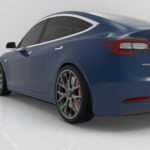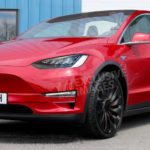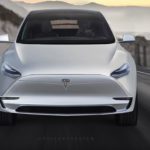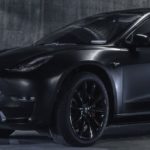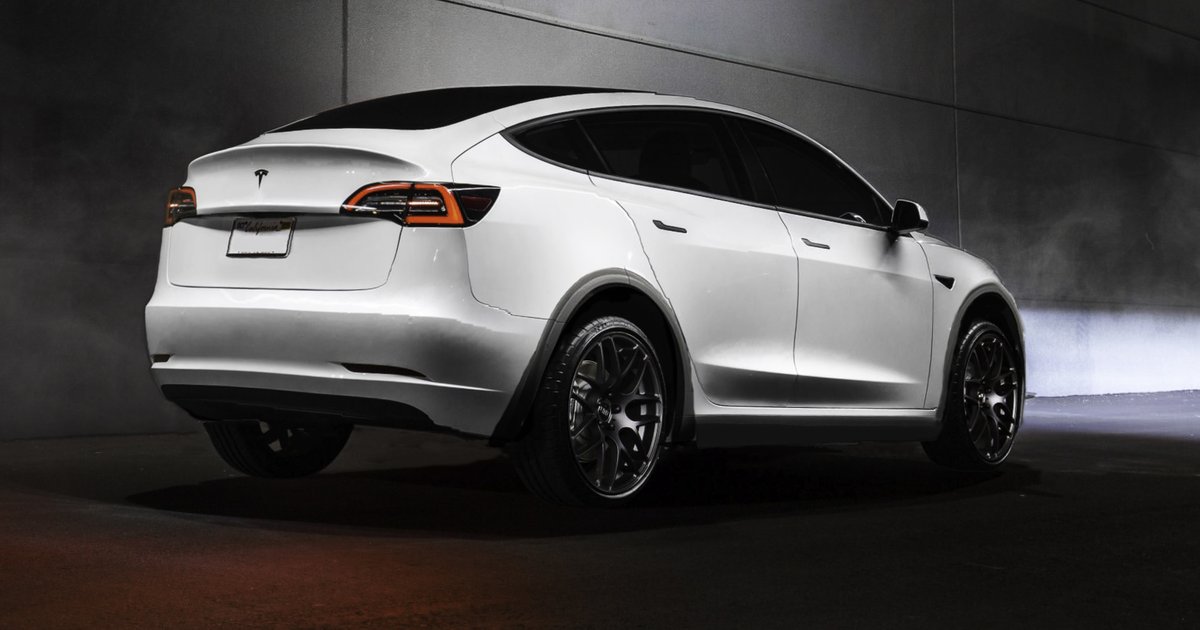
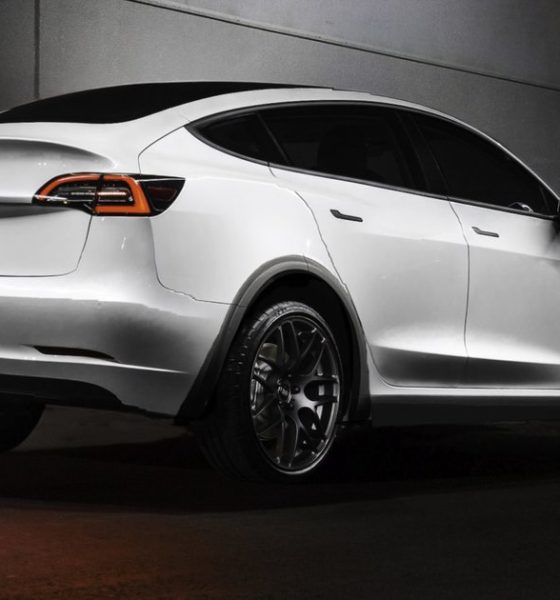
Investor's Corner
The Model Y represents a wiser Tesla and it should wake up the auto industry
It is now just a matter of time before Tesla unveils the next vehicle in its product roadmap — the Model Y. Aimed at the auto industry’s most lucrative segment today, the all-electric SUV and its potential success could definitively establish Tesla’s reputation as a successful carmaker. With this in mind, the Model Y’s 2019 release could be seen as a strategic move for Tesla, since the company is now at a point where it has matured enough to produce a vehicle of such magnitude and caliber as the all-electric SUV.
A competitive segment
The compact SUV segment in the United States is an incredibly competitive market. In 2018 alone, auto sales tracking website CarSalesBase noted that the Toyota Rav4 — the reigning king of compact SUVs — sold 427,168 units in the United States. In second place was the Nissan Rogue with 412,110 vehicles sold, and in third place was the Honda CR-V, which sold 379,013 units during 2019. Each of these vehicles sold so well, their individual sales exceeded Tesla’s record-breaking 2018 sales of 245,240 electric cars, which included 145,846 Model 3.
That said, Tesla’s 2018 sales for the Model 3 were no joke. With more than 145,000 units sold over the year, the electric sedan ended 2018 as the US’ best-selling luxury vehicle, far outselling its closest competitor — the Lexus RX, which also happens to be an SUV. It should be noted that the Model 3 accomplished this feat despite the United States generally preferring SUVs and pickup trucks over passenger cars. With the Model Y, Tesla would be removing this handicap, as the company would be competing in the SUV segment with an all-electric SUV that is bred to dominate.

From the Model 3 to the Model Y
The success of the Model 3 and the tribulations Tesla passed through during the vehicle’s ramp all contribute to help in the production of the Model Y. When Tesla started producing the Model 3, it was a carmaker whose experience was limited to the production of two relatively low-volume premium vehicles, and CEO Elon Musk was still prone to hyper-ambitious goals that border on the unrealistic. As Tesla went through the Model 3’s production challenges, and as the company hit its stride with the vehicle’s manufacturing, the electric car maker matured. This maturity became evident in Tesla’s Q2 2018 earnings call, when Elon Musk showed a notable amount of restraint and humility. Musk’s timelines since then have remained ambitious — though a lot more realistic — as shown in the company’s timetable for Gigafactory 3.
With a more mature Tesla and a more experienced Elon Musk leading the Model Y charge, the electric car maker could escape a considerable amount of the challenges it faced with the Model 3. Musk had expressed his optimism with Model Y production during the recently held fourth-quarter earnings call, when he noted that the vehicle would require much lower CAPEX than the electric sedan. Discussing the upcoming vehicle’s production further, Musk stated that the Model Y would likely see a seamless buildout, considering that it would likely be built in Gigafactory 1. This would be a notable advantage for the Model Y, considering that its battery packs would be made in the same site.
“Three-quarters of the Model Y is common with the Model 3, so it’s a much lower CAPEX per vehicle than Model 3, and the rest is also quite low. Model Y is, I think, 76% was when it got in common with the Model 3. And we’re most likely going to put Model Y production right next to — in fact, it’s part of our main Gigafactory in Nevada. So, it will just be right there. Batteries and powertrains will come out and go straight into the vehicle. So that also reduces our risk of execution and reduces the cost of having to transfer parts from California to Nevada. It’s not a for sure thing, but it’s quite likely, and it’s our default plan. I would expect Model Y will probably be — the thematic Model Y will be maybe 50% higher than Model 3, could be even double,” Musk said.
- A Tesla Model Y rendering. (Credit: Reese Wilson/Teslarati)
- Tesla Model Y rendering via AutoExpress
- Tesla Model Y rendering from Peisert Design
- An artist’s render of the Tesla Model Y. [Credit: Miguel Massé/Twitter]
The Tesla Model Y as imagined by concept artists. (Credit: Reese Wilson, AutoExpress, Peisert Design and Miguel Masse)
An impending disruption
The Model Y’s dominance will not be focused solely on the United States, either, considering that Tesla’s Gigafactory 3 in China is expected to manufacture the affordable versions of the all-electric SUV, which would be distributed to the Chinese market. Just like the United States, China is also a market that has a soft spot for SUVs. Such is the reason why the Tesla Model X — rather expensive vehicle that Musk describes as the “Fabergé egg of cars,” — is popular in China. With a lower-cost car like the Model Y in the market, Tesla’s potential in the Asian economic superpower would likely see a boost as well.
It could be said that much of Tesla’s challenges over the years were the result of its own hubris, as evidenced by the Model X’s overloaded tech and the Model 3 ramp’s over-reliance on automation. That said, there’s a good chance that Tesla would not make these same mistakes with the Model Y. With this in mind, it would be wise for veterans in the auto industry to take the upcoming vehicle seriously, and maybe come up with compelling electric cars of their own — not like seemingly converted vehicles like the Mercedes-Benz EQC either, but more like the Porsche Taycan, which was designed from the ground up as EV.
Just as the Model S and Model X caused a disruption on the higher end of the auto market, so would the Model 3 and Model Y. Provided that Tesla manages to produce both vehicles at scale, and provided that the company can release lower-cost variants that can attract a broader audience, the Model Y and its sedan sibling could ultimately become the electric cars that cement the company’s place in the hyper-competitive auto industry.

Elon Musk
Tesla stock gets latest synopsis from Jim Cramer: ‘It’s actually a robotics company’
“Turns out it’s actually a robotics and Cybercab company, and I want to buy, buy, buy. Yes, Tesla’s the paper that turned into scissors in one session,” Cramer said.

Tesla stock (NASDAQ: TSLA) got its latest synopsis from Wall Street analyst Jim Cramer, who finally realized something that many fans of the company have known all along: it’s not a car company. Instead, it’s a robotics company.
In a recent note that was released after Tesla reported Earnings in late January, Cramer seemed to recognize that the underwhelming financials and overall performance of the automotive division were not representative of the current state of affairs.
Instead, we’re seeing a company transition itself away from its early identity, essentially evolving like a caterpillar into a butterfly.
The narrative of the Earnings Call was simple: We’re not a car company, at least not from a birds-eye view. We’re an AI and Robotics company, and we are transitioning to this quicker than most people realize.
Tesla stock gets another analysis from Jim Cramer, and investors will like it
Tesla’s Q4 Earnings Call featured plenty of analysis from CEO Elon Musk and others, and some of the more minor details of the call were even indicative of a company that is moving toward AI instead of its cars. For example, the Model S and Model X will be no more after Q2, as Musk said that they serve relatively no purpose for the future.
Instead, Tesla is shifting its focus to the vehicles catered for autonomy and its Robotaxi and self-driving efforts.
Cramer recognizes this:
“…we got results from Tesla, which actually beat numbers, but nobody cares about the numbers here, as electric vehicles are the past. And according to CEO Elon Musk, the future of this company comes down to Cybercabs and humanoid robots. Stock fell more than 3% the next day. That may be because their capital expenditures budget was higher than expected, or maybe people wanted more details from the new businesses. At this point, I think Musk acolytes might be more excited about SpaceX, which is planning to come public later this year.”
He continued, highlighting the company’s true transition away from vehicles to its Cybercab, Optimus, and AI ambitions:
“I know it’s hard to believe how quickly this market can change its attitude. Last night, I heard a disastrous car company speak. Turns out it’s actually a robotics and Cybercab company, and I want to buy, buy, buy. Yes, Tesla’s the paper that turned into scissors in one session. I didn’t like it as a car company. Boy, I love it as a Cybercab and humanoid robot juggernaut. Call me a buyer and give me five robots while I’m at it.”
Cramer’s narrative seems to fit that of the most bullish Tesla investors. Anyone who is labeled a “permabull” has been echoing a similar sentiment over the past several years: Tesla is not a car company any longer.
Instead, the true focus is on the future and the potential that AI and Robotics bring to the company. It is truly difficult to put Tesla shares in the same group as companies like Ford, General Motors, and others.
Tesla shares are down less than half a percent at the time of publishing, trading at $423.69.
Elon Musk
Tesla to a $100T market cap? Elon Musk’s response may shock you

There are a lot of Tesla bulls out there who have astronomical expectations for the company, especially as its arm of reach has gone well past automotive and energy and entered artificial intelligence and robotics.
However, some of the most bullish Tesla investors believe the company could become worth $100 trillion, and CEO Elon Musk does not believe that number is completely out of the question, even if it sounds almost ridiculous.
To put that number into perspective, the top ten most valuable companies in the world — NVIDIA, Apple, Alphabet, Microsoft, Amazon, TSMC, Meta, Saudi Aramco, Broadcom, and Tesla — are worth roughly $26 trillion.
Will Tesla join the fold? Predicting a triple merger with SpaceX and xAI
Cathie Wood of ARK Invest believes the number is reasonable considering Tesla’s long-reaching industry ambitions:
“…in the world of AI, what do you have to have to win? You have to have proprietary data, and think about all the proprietary data he has, different kinds of proprietary data. Tesla, the language of the road; Neuralink, multiomics data; nobody else has that data. X, nobody else has that data either. I could see $100 trillion. I think it’s going to happen because of convergence. I think Tesla is the leading candidate [for $100 trillion] for the reason I just said.”
Musk said late last year that all of his companies seem to be “heading toward convergence,” and it’s started to come to fruition. Tesla invested in xAI, as revealed in its Q4 Earnings Shareholder Deck, and SpaceX recently acquired xAI, marking the first step in the potential for a massive umbrella of companies under Musk’s watch.
SpaceX officially acquires xAI, merging rockets with AI expertise
Now that it is happening, it seems Musk is even more enthusiastic about a massive valuation that would swell to nearly four-times the value of the top ten most valuable companies in the world currently, as he said on X, the idea of a $100 trillion valuation is “not impossible.”
It’s not impossible
— Elon Musk (@elonmusk) February 6, 2026
Tesla is not just a car company. With its many projects, including the launch of Robotaxi, the progress of the Optimus robot, and its AI ambitions, it has the potential to continue gaining value at an accelerating rate.
Musk’s comments show his confidence in Tesla’s numerous projects, especially as some begin to mature and some head toward their initial stages.
Elon Musk
Tesla director pay lawsuit sees lawyer fees slashed by $100 million
The ruling leaves the case’s underlying settlement intact while significantly reducing what the plaintiffs’ attorneys will receive.

The Delaware Supreme Court has cut more than $100 million from a legal fee award tied to a shareholder lawsuit challenging compensation paid to Tesla directors between 2017 and 2020.
The ruling leaves the case’s underlying settlement intact while significantly reducing what the plaintiffs’ attorneys will receive.
Delaware Supreme Court trims legal fees
As noted in a Bloomberg Law report, the case targeted pay granted to Tesla directors, including CEO Elon Musk, Oracle founder Larry Ellison, Kimbal Musk, and Rupert Murdoch. The Delaware Chancery Court had awarded $176 million to the plaintiffs. Tesla’s board must also return stock options and forego years worth of pay.
As per Chief Justice Collins J. Seitz Jr. in an opinion for the Delaware Supreme Court’s full five-member panel, however, the decision of the Delaware Chancery Court to award $176 million to a pension fund’s law firm “erred by including in its financial benefit analysis the intrinsic value” of options being returned by Tesla’s board.
The justices then reduced the fee award from $176 million to $70.9 million. “As we measure it, $71 million reflects a reasonable fee for counsel’s efforts and does not result in a windfall,” Chief Justice Seitz wrote.
Other settlement terms still intact
The Supreme Court upheld the settlement itself, which requires Tesla’s board to return stock and options valued at up to $735 million and to forgo three years of additional compensation worth about $184 million.
Tesla argued during oral arguments that a fee award closer to $70 million would be appropriate. Interestingly enough, back in October, Justice Karen L. Valihura noted that the $176 award was $60 million more than the Delaware judiciary’s budget from the previous year. This was quite interesting as the case was “settled midstream.”
The lawsuit was brought by a pension fund on behalf of Tesla shareholders and focused exclusively on director pay during the 2017–2020 period. The case is separate from other high-profile compensation disputes involving Elon Musk.
